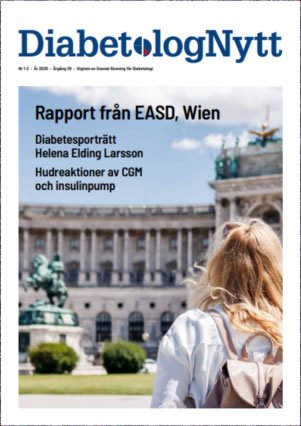CHICAGO — Targeted education to help type 1 diabetes patients avoid hypoglycemia benefited those with impaired hypoglycemic awareness, regardless of the technology they used.
The findings, from a 24-week randomized trial named Hypo COMPASS, were reported here at the American Diabetes Association (ADA) 2013 Scientific Sessions by Stuart A. Little, MBBS, an endocrinologist from Newcastle University, United Kingdom.
About one quarter of patients with type 1 diabetes have impaired awareness of hypoglycemia (IAH), and those individuals are 6 times more likely than others with the condition to experience life-threatening severe episodes, Dr. Little noted.
The type 1 diabetes patients with IAH were randomized to 1 of 4 treatment groups: insulin pump, with or without continuous glucose monitoring (CGM), or multiple daily injections of insulin, with or without GCM. Standardized education about avoidance of biochemical hypoglycemia resulted in an equal reduction in hypoglycemia episodes across all 4 study groups, with no significant differences.
But the findings should not be interpreted to mean that insulin pumps and the real-time glucose sensors employed in CGM are not helpful, Dr. Little told Medscape Medical News. ”I don’t think you can use technology without education. I think they go hand in hand. I think you can’t just give someone a pump and a real-time sensor and say that’s how you avoid hypoglycemia.”
Session moderator Marjorie Cypress, PhD, RN, from Albuquerque Health Partners, New Mexico, ADA president-elect, healthcare and education, agreed. Training is key, she said: ”You provide good education on how to avoid hypoglycemia, and hypoglycemia goes down… Technology’s not perfect, that’s the bottom line.”
Technologies Equivalent With Education
The 96 study subjects were aged 18 to 74 years (average age, 49 years), had a mean diabetes duration of 29 years, were C-peptide negative, and had impaired awareness of hypoglycemia (IAH), as defined by a score of 4 or higher on the validated Gold Score. The Gold score asks a single question: ”Do you know when your hypos are commencing?” The respondent completes a 7-point scale, with 1 being ”always aware” and 7 representing ”never aware” (Diabetes Care. 1994;17:697-703).
Two thirds of the participants were women. A majority had retinopathy, and about a quarter had nephropathy and/or treated thyroid disease. About a fifth had peripheral neuropathy. Mean hemoglobin A1c was 8.2% (66 mmol/mol).
All patients received a 2-hour education session involving the 4 elements of Hypo COMPASS, aimed at strict avoidance of biochemical hypoglycemia (< 3 mmol/L [<54 mg/dL]) while maintaining overall glycemic control:
-
Never delay hypoglycemia treatment.
-
Identify individual times of increased risk.
-
Recognize subtle symptoms of hypoglycemia.
-
Be particularly vigilant about detecting and preventing nighttime hypoglycemia.
Subjects were randomized to insulin-pump therapy using insulin aspart or multiple daily injections using aspart and glargine, with or without real-time CGM. All patients performed frequent self blood glucose monitoring.
At 24 weeks, the median Gold score had improved from 5 to 4 (P < .001 vs baseline), and the number of minutes per day spent in biochemical hypoglycemia had dropped significantly, from 53.3 to 24.5 (P < .001 vs baseline).
Episodes of severe hypoglycemia — defined as needing assistance for treatment — dropped from 9 at baseline to 1 at 24 weeks (P < .001), with the proportion of patients affected declining from 92% in the year prior to the trial to just 19% during the trial, Dr. Little reported.
Mean insulin doses dropped significantly (by about 8 units) during the trial (P < .001), but HbA1c values did not change.
There were no statistically significant differences between the 4 groups at 24 weeks in Gold score, severe hypoglycemic episodes, mean insulin dose, or HbA1c.
A Holistic Approach; Data Useless Without Awareness
Dr. Little told Medscape Medical News that all of the interventions in the study were important, and he stressed that the investigators did not know who the responders and nonresponders were within each treatment group.
”We use an incremental approach in all therapies in a holistic way to provide what’s best for the patients to avoid biochemical hypoglycemia. I think that’s the key.”
Overall, patient-reported outcomes on the Hypoglycemia Fear Survey and the Diabetes Treatment Satisfaction Questionnaire both improved at 24 weeks ( P < .001 vs baseline). There were no differences between the treatment groups at 24 weeks except that those on insulin pumps were more satisfied with their treatment (P < .001 vs baseline).
Dr. Cypress told Medscape Medical News that she was not surprised by the findings. ”Even with [glucose] sensors, it’s hard to manage diabetes. There are a lot of variables.”
Outcomes largely depend on how patients respond to the information provided by the glucose sensors, she added.
”Even though you have all this data, it’s how you respond to the data. For some people, that’s really hard. Some people are put on these [sensors] inappropriately, because they don’t have the problem-solving skills… It’s the education piece that’s so important. You can’t just hook someone up and say, ’Here go.’ ”
The study was funded by Diabetes UK. Neither Dr. Little nor Dr. Cypress have reported any relevant financial relationships.
American Diabetes Association 2013 Scientific Sessions. Abstract 387-OR , presented June 25, 2013.
From www.medpagetoday.com
Nyhetsinfo
www red DiabetologNytt

